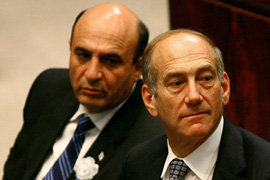Profile: Shaul Mofaz
Mofaz, army chief turned hawkish politician, is joining Netanyahu’s coalition as deputy prime minister.

Mofaz was born in Tehran on November 4, 1948, and lived there until emigrating to Israel in 1957.
Joining the army just before the 1967 War, he climbed the ranks until appointed chief of staff in 1988 under Binyamin Netanyahu, then and current prime minister and head of the Likud party.
Two years later in 1990, Mofaz was entrusted by Ehud Barak, the then Labour prime minister, with the task of pulling Israeli forces out of south Lebanon after two decades of occupation.
He soon underlined his credentials in the early months of the intifada, or catastrophe, for his outspoken attacks on the Palestinian Authority, which he branded a “terrorist entity” in March 2001.
Mofaz led the army’s invasion of the West Bank in the spring of 2001 and began a siege of Yasser Arafat, the former Palestinian leader, in his West Bank compound.
Like Olmert and Tzipi Livni, both leaders within Kadima, Mofaz had long seemed at home in Netanyahu’s Likud party, but like them was persuaded to move to the centrist Kadima by Ariel Sharon, the party’s founder, in late 2005.
The decision allowed Mofaz to save his job as defence minister.
Mofaz’s ambitions
Having entered the government only in October 2002, Mofaz won Sharon’s gratitude and respect for steering through the withdrawal of troops and settlers from the Gaza Strip in 2005.
 |
| Mofaz was among the first Israeli officials to publicly moot the possibility of attacking Iran |
The move earned him and Sharon the enmity of many within Likud.
Mofaz is also noted for his hardline stance on the issue of his former homeland.
As deputy prime minister in a former Kadima-headed government in 2008, Mofaz was among the first Israeli officials to publicly moot the possibility of an attack on Iran.
In June 2008, he told an Israeli newspaper: “If Iran continues its nuclear weapons programme, we will attack it”.
Israel has long considered Iran its main strategic threat because of its accelerating nuclear programme, which Israel and the West believe is aimed at developing nuclear weapons.
Officials in Tehran, the Iranian capital, insist the programme is peaceful.
Mofaz’s remarks were criticised by the Israeli defence ministry and the local media, but in retrospect may have been the first volley his campaign that pitted him against Livni, a former Mossad spy with a similar reputation for toughness.
Mofaz has been more circumspect while in the opposition, saying Israel should not hasten to break ranks with war-wary world powers that are trying to pressure Iran through sanctions and negotiations.
Gerald Steinberg, a political scientist at Bar-Ilan University near Tel Aviv, said the new coalition deal with Netanyahu’s Likud “sends a very strong signal to Tehran, but also to Europe and the United States, that Israel is united and the leadership is capable of dealing with the threats that are there if and when it becomes necessary”.